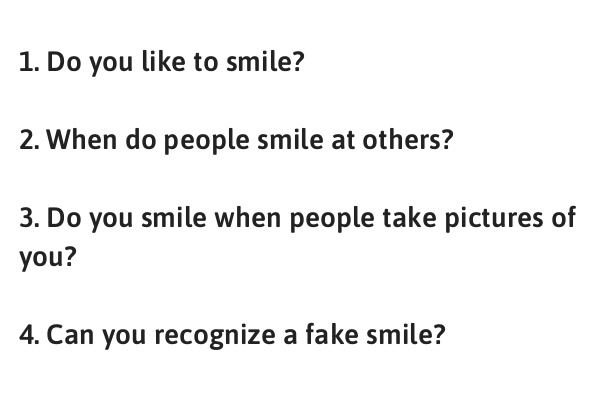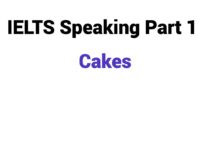Table of Contents
Smile

SAMPLE ANSWERS
1. Do you like to smile?
Yes, most people say that I have a cheerful disposition.
I always remind myself that life isn’t simple and it doesn’t come without obstacles, so smiling keeps you always optimistic. As I see it, people with great smiles radiate a warmth that draws others to them instantly.
2. When do people smile at others?
People smile for different reasons, in various contexts.
Most often, people of all ages will smile when something is giving them pleasure. Sometimes we do smile simply because we are happy, but we also smile for social reasons and to put people at ease, as well as to show more complex emotions, such as resignation.
3. Do you smile when people take pictures of you?
Yes, I actually smile all the time.
Smiling in pictures makes me look more photogenic and approachable. Besides, I smile to spread happiness. Pictures are clicked to capture and relive the moment. And how do we like to do that? In a happy way! So we smile.
4. Can you recognize a fake smile?
Yes, probably.
When you smile genuinely, there are two kinds of muscles involved in your face. A spontaneous smile of joy has upward and widening movement of the mouth into a broad grin, and movement of the muscle around the eyes. A fake or social smile, controlled by the motor cortex, has only the upward movement of the mouth, it is slower and less symmetric.
Vocabulary
1. disposition [n]: the particular type of character that a person naturally has:
Eg: She is of a nervous/ cheerful/ sunny disposition.
2. obstacle [n]: something that blocks you so that movement, going forward, or action is prevented or made more difficult
Eg: The biggest obstacle in our way was a tree trunk in the road.
3. radiate [v]: to express strongly an emotion or quality, or (of an emotion or quality) to be expressed strongly by someone
Eg: He simply radiates integrity.
4. context [n]: the situation within which something exists or happens, and that can help explain it
Eg: It is important to see all the fighting and bloodshed in his plays in historical context.
5. at ease [expression]: relaxed
Eg: She soon put/set me at ease (= made me relaxed).
6. resignation [n]: a sad feeling of accepting something that you do not like because you cannot easily change it
Eg: She received the disappointing news with resignation.
7. photogenic [adj]: having a face that looks attractive in photograph
Eg: It is the photogenic young man or woman who becomes a political leader —and perhaps we are all the better for that.
8. capture [v]: if something captures your imagination or attention, you feel very interested and excited by it
Eg: The American drive to land a man on the Moon captured the imagination/attention of the wholeworld.
9. spontaneous [adj]: happening or done in a natural, often sudden way, without any planning or without being forced
Eg: His jokes seemed spontaneous, but were in fact carefully prepared beforehand.
10. symmetric [adj]: having similarity in size, shape, and relative position of corresponding parts
Eg: The structure is completely symmetric.


